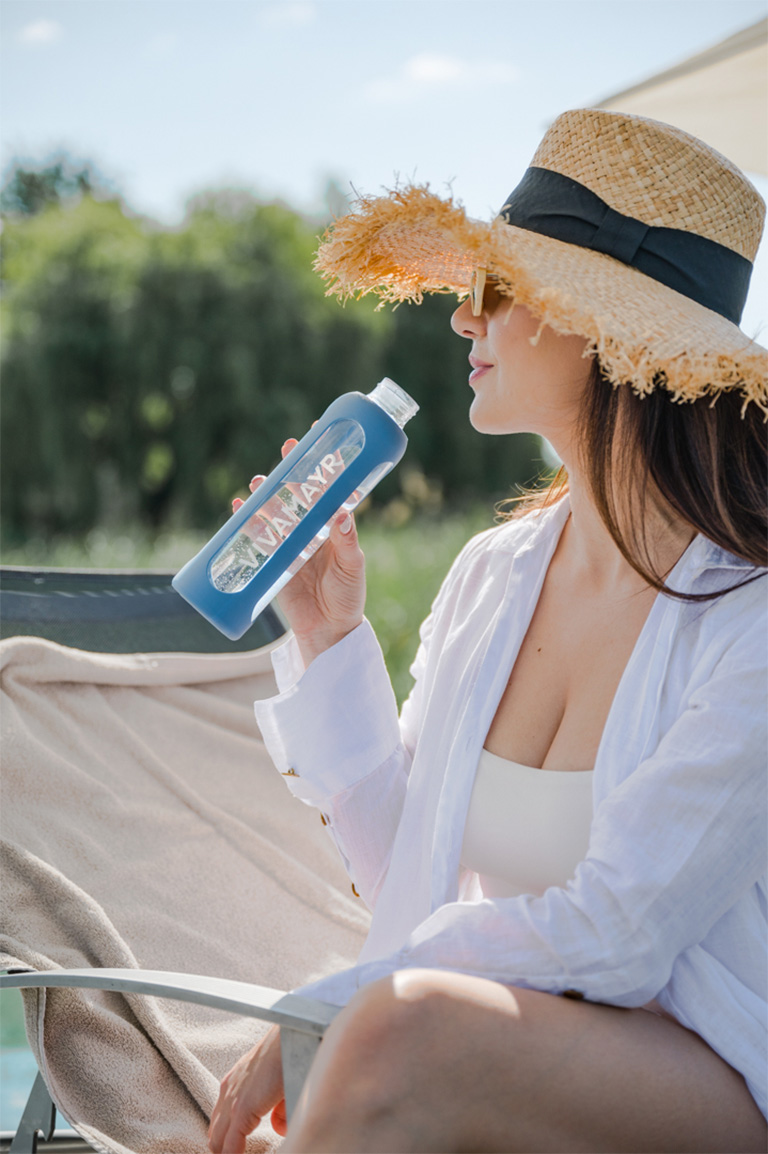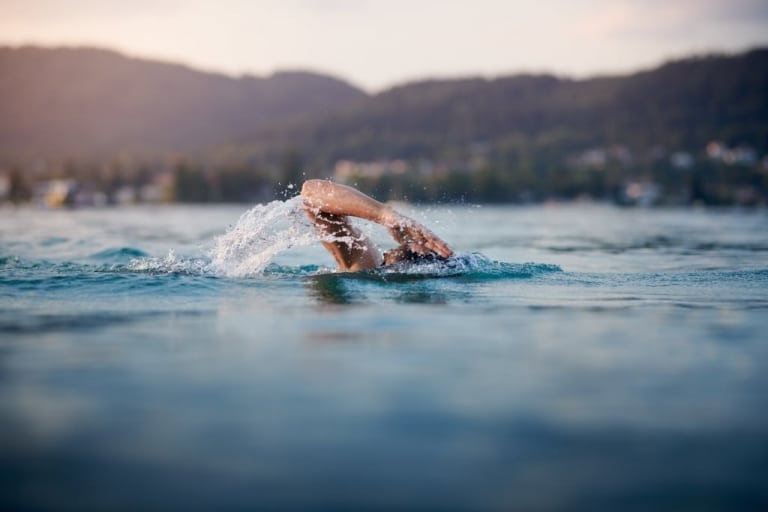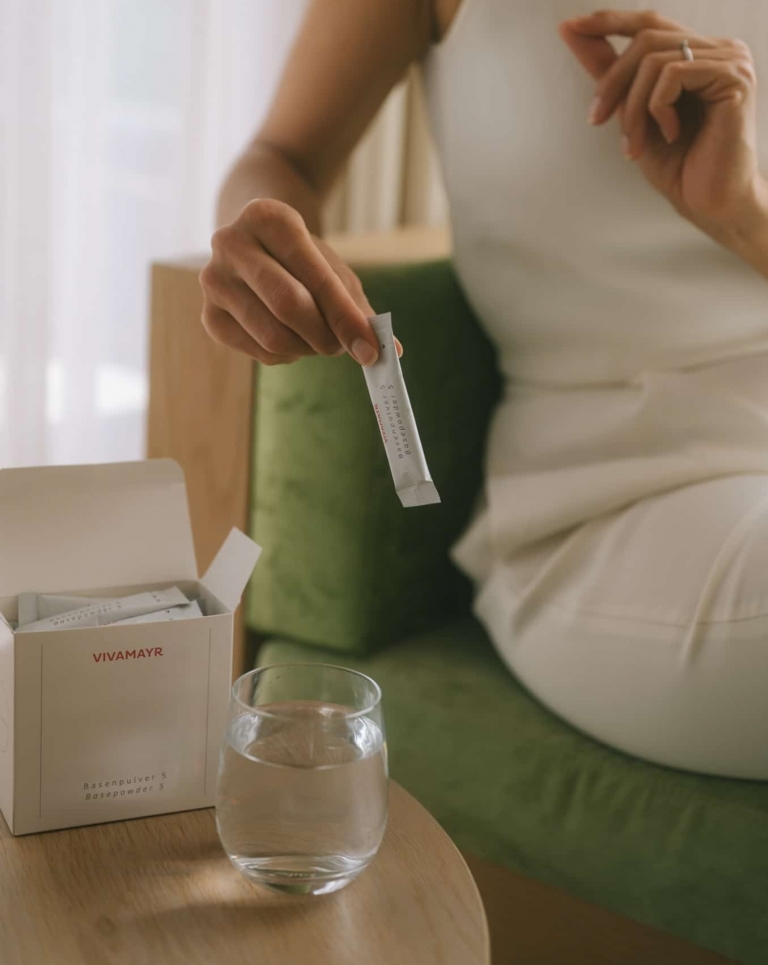Everything you need to know about water
Without water, there is no life. There’s no doubt that water is our ultimate elixir of life. But why? What makes water our most important drink and how much of it do we really need each day? Together with Dr Werner Zancolo, medical director at the VIVAMAYR Health Resort Maria Wörth, we explore the answers to these and other questions about body water, water absorption and a healthy water balance.
Water: so much and yet so little
Our planet is about two thirds water. Incredibly, 97.5 percent of this is salt water, found in our seas and oceans. At just 2.5 percent of the world’s water reserves, the proportion of fresh water is comparatively low. And yet lower is the amount accessible to humans – around 0.3 percent. This is located in lakes, rivers and reservoirs. And yet it is all part of one huge water cycle that is vital for our Earth and climatic conditions. The need for sufficient water in this “big picture” is reflected in the miniature cycle that takes place in us humans. After all, water is also essential to our survival.
All life first began in the water and flourished there before continuing to develop on land. Ultimately, this is where Homo sapiens, humans in our present-day form, also originated. Thus it seems to be a consequence of evolution that we humans – just like all other living beings – need water to survive. All of our metabolic processes and organs require water, and even the lymphatic flow and blood need a specific consistency, i.e. a certain flow property, to carry out their tasks and keep the body healthy. This is in contrast to the shattering effect on our organism caused by a lack of water; even a small deficiency in water can have a negative effect, making us unfocused, tired and generally more prone to errors.

What happens when the body doesn’t get enough water
The limits established by the German Nutrition Society illustrate what happens as the body loses water. For example, when we lose just 0.5 percent of our body weight in water, a feeling of thirst occurs and our ability to concentrate decreases. If we lose three to five percent of our body weight in water, the production of saliva and urine decreases and our physical and mental capacities are significantly impaired. “Clear signs of this are a headache and a dry mouth,” explains Dr Werner Zancolo. “But heartburn and pain can also be a sign that there is not enough water in the body,” he continues, advising that “it’s better to drink preventively to avoid the sensation of thirst in the first place.” His recommendation is to “drink one glass of water every hour.”
Ideally, according to the doctor – and in keeping with the VIVAMAYR nutrition philosophy – we should drink between meals and around meals and refrain from drinking directly with food. “Drinking with our food only dilutes the digestive juices in the stomach and impedes the digestion of foods considerably,” he explains.
However, water – drunk at the right time – can also have a stimulating effect on digestion. Dr Zancolo shares his tip, “For this, drink half a liter of lukewarm water in the morning, right after getting up and on an empty stomach.” Firstly, this balances out the loss of fluids that occurs overnight. And secondly, a little water in the stomach prepares the stomach mucosa for digestion and ensures that breakfast can be broken down more easily and nutrients can be better absorbed. “In general, however, you should wait around one hour after eating before drinking anything. The heavier your meal, the longer you should wait, so as not to impair the digestive process,” advises the doctor.

Lukewarm water is the best beverage
“The best drink for our body and our health is clear water,” says Dr Zancolo succinctly, explaining that tap water is normally sufficient in regions with a good supply. However, we can quickly need more. During high temperatures or sports, it is advisable to compensate for the fluids lost through sweating as swiftly as possible, in order to prevent a loss of performance or circulation problems. With normal activity, our body loses about half a liter of water per day via the skin. When we add movement, intense sports or high temperatures, this figure can increase greatly. But other factors such as burns and health issues, like fever, diabetes, diarrhea, vomiting and chronic bowel inflammation also cause an increased need for fluids.
If this is the case, it can be helpful to consume still mineral water rather than tap water. “Tap water also contains important minerals such as calcium, magnesium and potassium. But mineral water is enriched with these nutrients, which is great for compensating for the increased mineral needs that can arise as a result of sweating,” Dr Zancolo explains. Is carbonated mineral water just as suitable in this case? “Not necessarily! The added carbonic acid, as the name suggests, has an acidic effect on our body. The effects of a diet that is already characterized by acidic foods can be intensified as a result. This is why it is advisable to enjoy carbonated water in moderation,” explains the health expert. His tip for supporting the body’s acid-base balance with the liquids that we consume is to “mix a small quantity of alkaline powder in with your tap water.”

For a more gentle effect on the body and in order to facilitate water absorption, water should be drunk either warm or at least lukewarm. “Slightly cool water is also acceptable. However, if water is drunk too cold, the body has to work to warm the water up to its operating temperature of approximately 37 degrees Celsius, which uses unnecessary energy and can weaken the body. What’s more, water that is too cold can also irritate the stomach mucosa and stop it functioning properly. This can lead to inflammatory processes and heartburn,” the health expert explains. Lukewarm water is generally well tolerated and also has a cooling effect on the body in summer. On hot days, the body’s core temperature can be slightly raised, meaning that even lukewarm water achieves a pleasantly cooling effect.
What exactly is body water?
You’ve probably heard the term body water before, but what is actually behind this concept? It often pops up in the context of body composition measurements. Dr Zancolo clears up the confusion, “the expression ‘body water’ is frequently used as a collective term for the percentage of water in the body. As soon as water enters our body, it can basically be described as body water.”
Water can either be stored inside the cells (intracellular), such as in muscles, the liver and the brain, or outside the cells (extracellular), for example in the connective tissue, the plasma, the lymph and various cavities. While the body of a child consists of around 75 percent water, this figure drops to around 50 percent in older adults. This is due to the natural muscle loss and poorer fluid supply associated with aging. As we get older, we often forget to drink, since our sensation of thirst diminishes, and natural muscle loss means that our capacity to store water also decreases.

How much you should drink each day?
For an adult of average height and weight, Dr Zancolo advises drinking around one and a half to two liters of water per day. If necessary, for example due to heat or sports, you should drink more. However, the water that we consume via our food can also be counted towards our fluid balance. Fruit and vegetables, in addition to grain-based products such as rice or pasta, consist of varying ratios of water, which benefit the body.
The path of water: it needs to be fast!
For water to be available to the body, it needs to pass through the stomach rapidly, since the water absorption mainly occurs in the intestines. Around 65 percent is absorbed via osmosis through the intestinal wall in the small intestine, where it then enters the blood and the cells. The rest continues on to the large intestine together with the digested food. There, the leftovers from digestion are condensed, which means that the roughly 35 percent remaining water is absorbed into the body via the intestine wall, together with electrolytes and nutrients. A small leftover amount is excreted via feces.
What is remarkable is that the intestine is only able to receive around 200 milliliters of water at a time. This is why drinking more in one go doesn’t make sense. Since it cannot be made available to the body, it would be eliminated straight away. The color of our urine provides a glimpse into how well the body is currently supplied with water. “The lighter, the better” is the motto here. It is also possible to drink too much water, but this is very rarely the case. “Instead, we see the opposite in our daily work in that people suffer from constipation, which can be a sign of dehydration. This is often compounded by a diet low in fiber and rich in carbohydrates, along with a lack of movement, which further exacerbates the problem,” Dr Werner Zancolo explains.
Do you have questions about the services we offer? We will be happy to help you and look forward to receiving your inquiry!

Drinking water made easy – our top tips in a nutshell:
- Drink at least 1.5 to 2 liters of still water per day.
- For a little variety and some added flavor, try adding mint, lime, lemon or lemon balm. Gently infused herbal teas are also recommended.
- If you drink fruit juice, it’s very important to dilute it with at least two thirds water.
- If you drink carbonated water, do so in moderation.
- Drink the majority of your fluids between meals and avoid drinking directly with your food.
- A little alkaline powder mixed into your water provides additional support for a healthy acid-base balance.
- Drink even if you don’t feel thirsty. The guideline here is one glass of water every hour.
Sources
o. V., o. D., Wasserresorption [Water absorption], accessed 9.7.2021, 08:19
Peters Sarah, 23.5.2018, Wissenschaftler erklärt: Das passiert im Körper, wenn wir zu wenig Wasser trinken [Scientist explains: This is what happens in the body when we drink too little water], accessed 8.7.2021, 16:31
Schwenner Lara, 24.5.2019, So viel Wasser gibt es auf der Erde [This is how much water there is on earth], accessed 8.7.2021, 15:50











